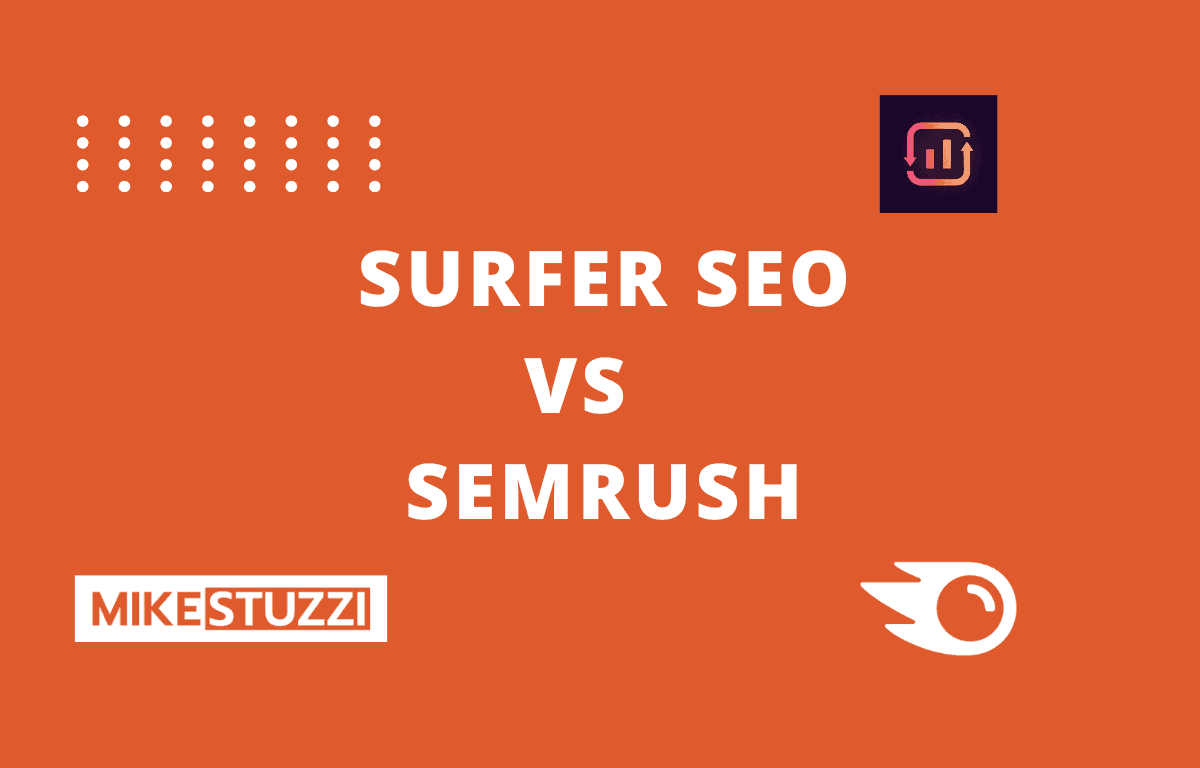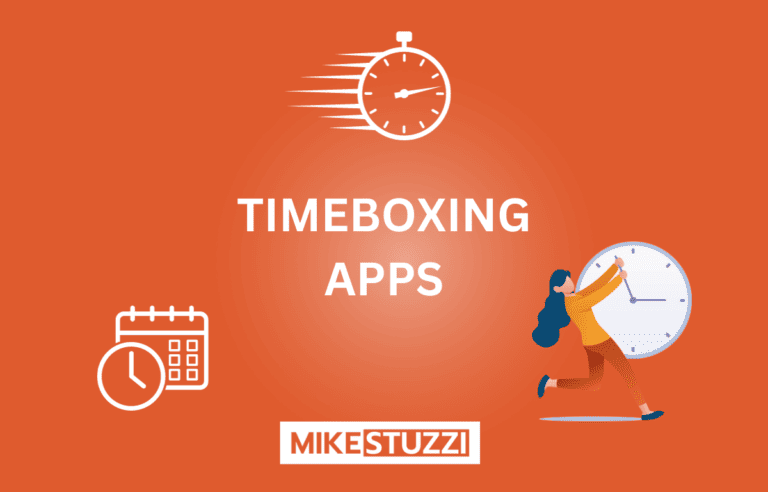Surfer SEO vs Semrush: Which SEO Tool is Better in 2024?
When it comes to effectively optimizing your website for search engines, having the right tools at your disposal is essential. In the world of SEO tools, two prominent names that are often compared are Surfer SEO and Semrush.
True to say, these two tools have similarities in that they both can help you get better rankings and boost your organic traffic from Google. But Surfer SEO and Semrush have several differences in how they can help you achieve the same.
In this Surfer SEO vs Semrush comparison article, we’ll explore each tool’s unique features and capabilities to provide you with valuable insights for your SEO strategy. It doesn’t matter whether you’re a seasoned SEO professional or just starting your digital journey.
Keep reading to discover which of these two SEO toolsets aligns best with your goals and objectives.
Disclaimer: Because the site is reader-supported, we may earn a commission if you use our affiliate links. More info here.
Surfer SEO vs Semrush: Overview
We’ll begin with quick details on what each tool is and how it works.
What Is Surfer SEO?
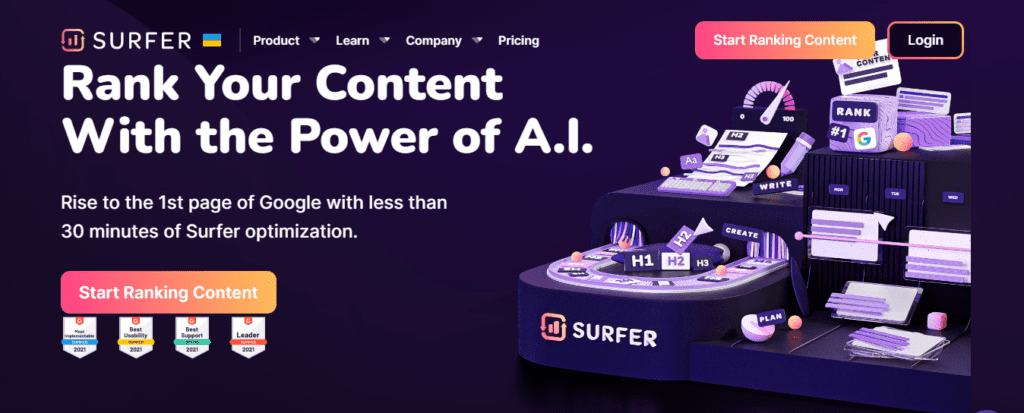
Surfer SEO is a tool that helps optimize website content for search engines. This AI SEO tool was founded in 2017 by a small team of SEO experts.
Surfer SEO provides data-driven recommendations and insights to improve various on-page SEO factors to enable Google and other search engines to understand your content. The tool analyzes top-ranking pages for a given keyword and provides recommendations on factors like word count, headings, keyword usage, content structure, and more.
It also offers a content editor that allows you to write and optimize your content directly within the tool. It would be like using Google Docs but with optimization suggestions provided for you.
Read more about Surfer SEO in this review.
What Is Semrush?

Semrush is a popular SEO automation tool that many online business owners trust. It started in 2008 as a small group of SEO professionals and IT specialists and has since evolved into a giant Internet platform.
Unlike Surfer which focuses on optimizing website content, Semrush covers a wide range of SEO services, ranging from keyword research to backlinks analysis and more.
The Semrush SEO tool suite helps you find keywords for specific services or products and provides recommendations on how to use them in your content. It also shows you how well your pages are ranking and what changes you can make to improve them.
Semrush is a great tool for website owners and SEO professionals alike. Besides SEO, its suite of features can also guide your digital marketing efforts in general.
Read more about Semrush and its free trial.
Surfer SEO and Semrush Integration
Before we go further, it would be best to inform you that Surfer integrates with Semrush. By the end of this comparison article, if you decide to use both tools, you could link them together and access all their functions in one place.
Check out this quick video of Surfer x Semrush:
Surfer SEO vs Semrush: Features
Now, let’s explore the similarities and differences in features between Surfer SEO and Semrush.
We’ll look at three main aspects of SEO inside the two tools:
- Keyword research
- Content optimization
- Competitor analysis
Surfer SEO: Keyword Research
It all begins with keyword research on Semrush so you’re able to optimize your content later on around the identified target keyword. The platform has a keyword-finding function that enables you to identify more information about a specified keyword by country or location.
Below is how the Surfer SEO keyword research tool looks, along with my input for the keyword I’m researching.

Once you click to begin your research, the tool takes some seconds to prepare keyword data for you based on search engine results pages (SERP) analysis.
The thing about Surfer is that it has keyword clustering abilities. So, based on your initial keyword input, you’ll see groupings of other related keywords categorized by search intent.
These intents are as follows:
- Local: These are searches involving a particular geographic location.
- Customer investigation: When someone wants to buy something and is looking for information.
- Informational: This is the intent when a user is searching for information on a product, service, or topic.
- Shopping: In this case, the user is ready to make a purchase.
And here’s one of the keyword groupings Surfer provided:
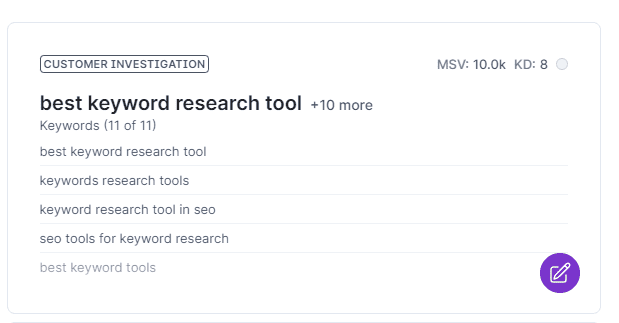
From the screenshot above, you can see the monthly search volume (MSV) and keyword difficulty (KD).
Clicking on a particular cluster provides you with detailed information about the other keywords that have been included in the group. Check below:
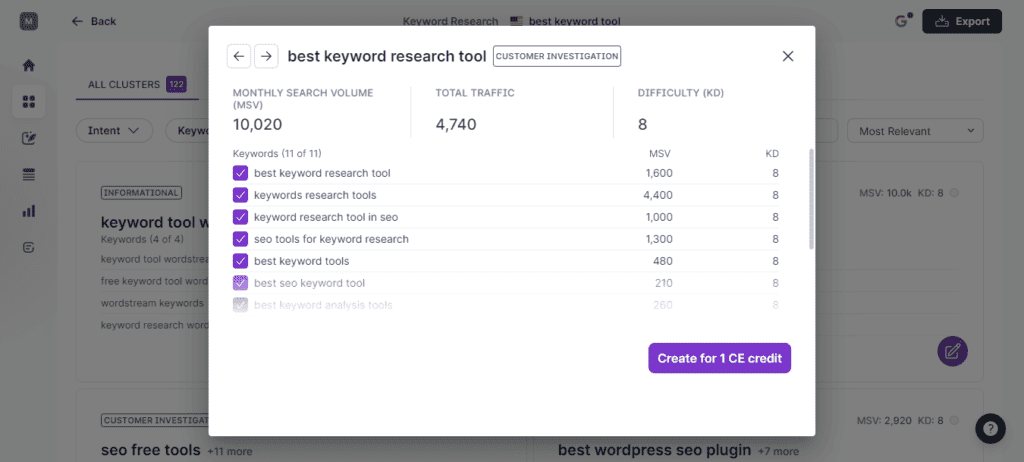
Once you find a suitable keyword cluster, you just need to instruct Surfer to prepare its Content Editor with those keywords. In other words, you can begin writing and Surfer will provide suggestions based on the keywords you selected.
Semrush: Keyword Research
Semrush is known for its set of keyword tools that enable you to delve deep into any random word you have in mind. Unlike Surfer SEO, Semrush offers several keyword research tools and not just a single one.
They are shown below:
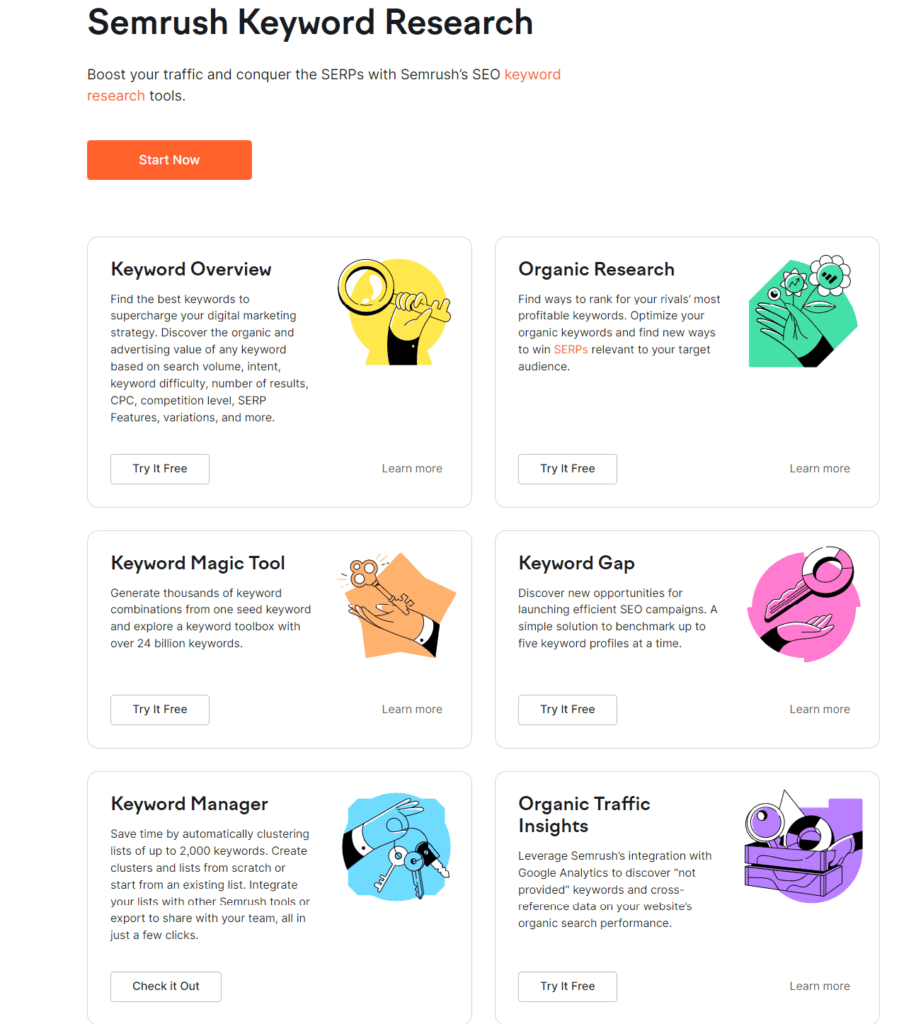
We’ll go through each of these Semrush keyword tools, but I’ll focus more on the most important ones.
Keyword Overview
Semrush’s Keyword Overview will take into account the keyword you enter and provide a detailed report on it. Similar to Surfer SEO, you can select the country for which you want keyword insights, such as the USA.

Below are the results, showing the search traffic volume of the country (USA), global volume, keyword difficulty, and cost per click (CPC):
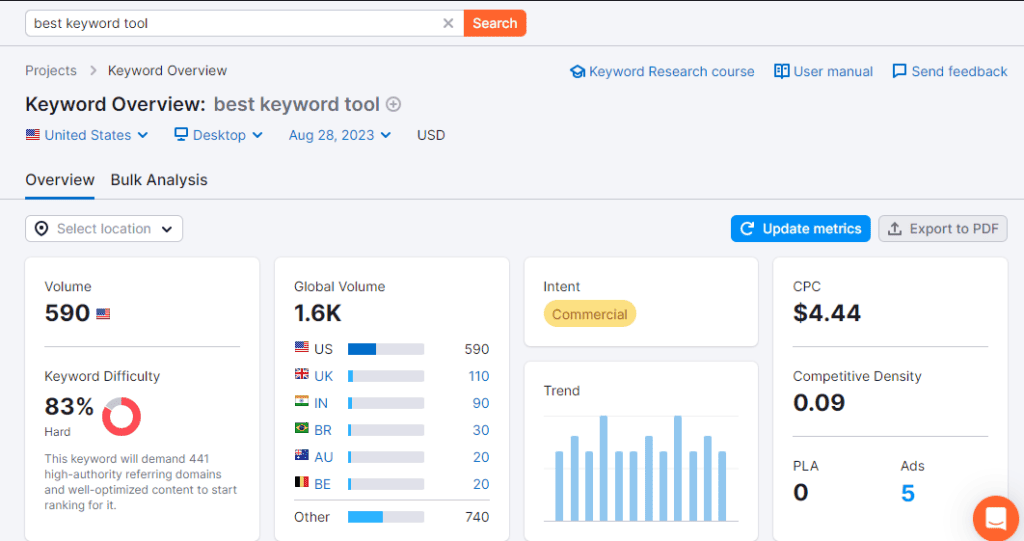
You can even see the intent behind the keyword. Semrush’s keyword intents are:
- Informational: When the searcher is looking for details about a product, service, or topic.
- Navigational: This means that someone is looking for a specific site or page, e.g. the sign-up or login page of a platform.
- Commercial: This intent signifies an interest in the user purchasing a product or service, but still in the investigating phase.
- Transactional: Transactional intent is when the user is ready to make a purchase.
If you scroll down right on the keyword overview page, you’ll find other keyword suggestions from Semrush:
If you click on one of the results, you get more data for the keyword you’ve clicked on.
Keyword Magic Tool
Next up on this Surfer SEO vs Semrush keyword research comparison is Semrush’s Keyword Magic Tool. What this tool does is provide you with keyword combinations based on the seed keyword you type in.
In simpler terms, you can enter any random word you’re thinking of and find suitable keyword ideas around it.

Check the results below:
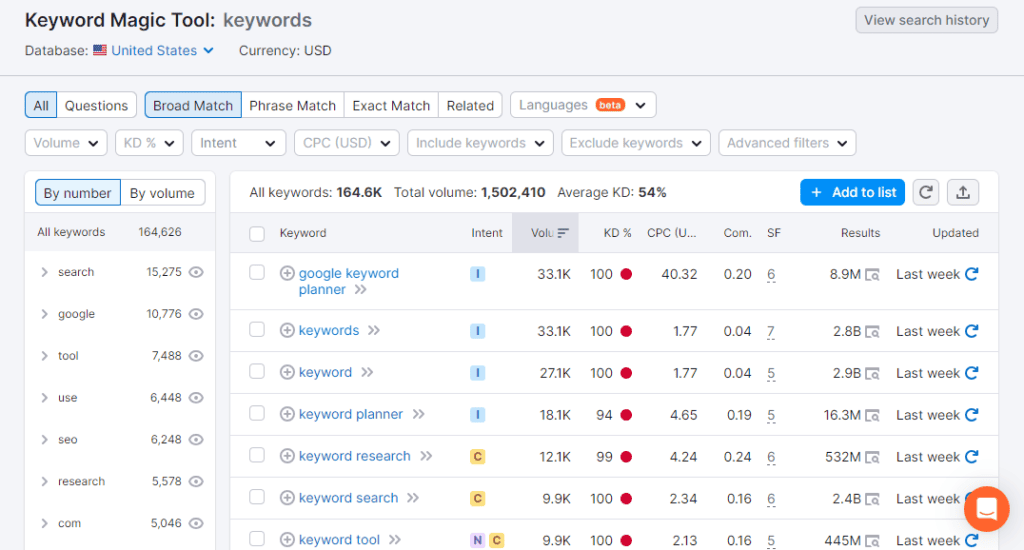
If you select any of the listed results, you’re redirected to the Keyword Overview tool that shows a detailed analysis of the selected keyword.
Remember, the Semrush Keyword Magic Tool works like magic. You don’t have to stress yourself thinking about what to type into it. You can input any one word and get hundreds of new keyword ideas based on it.
Keyword Manager
Keyword Manager by Semrush is the tool you need for grouping keywords. Check the sample below:
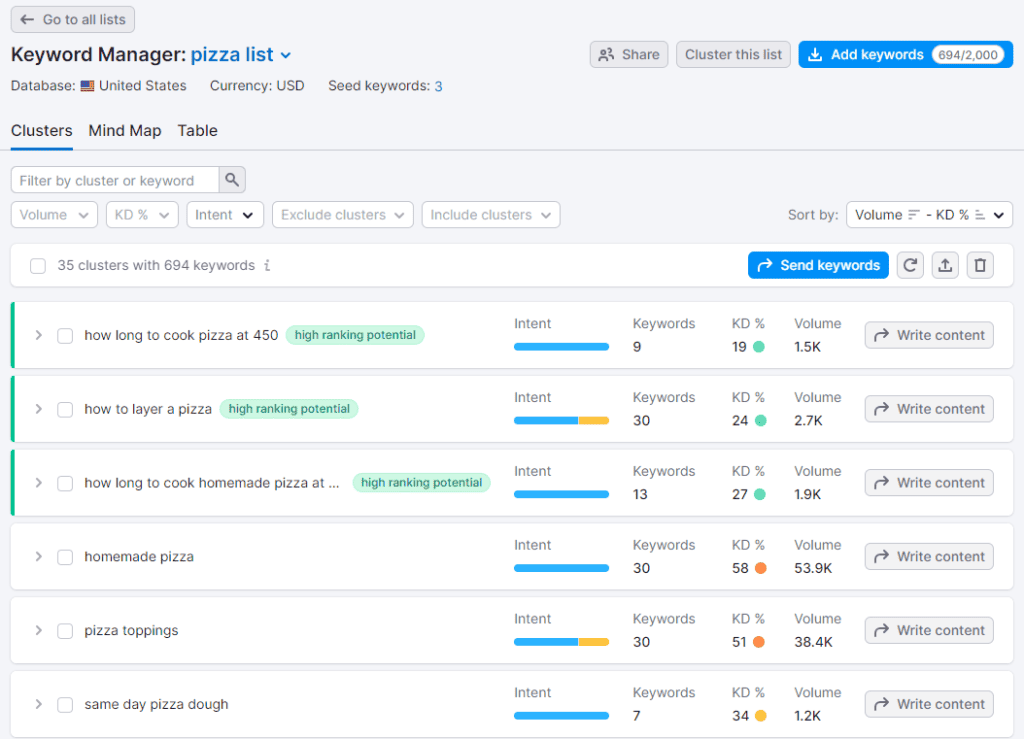
As you can see, these are a group of keywords around a single simple word. You can use such a keyword grouping to build topical authority in your niche by creating content from the listed keywords.
Other Mentionable Semrush Keyword Tools
Now, Semrush has more keyword tools, but they also fall under competitive research. So, instead of covering them here, find more information about them in the Surfer SEO vs Semrush Competitor Analysis sections later on in this article.
These tools are:
Keyword Gap: Keyword Gap simply helps you find what your competitors are ranking for that you haven’t covered on your blog. It’s the lazy way to find new content ideas based on what’s already working for other people in your niche.
Organic Research: This Semrush tool shows you the keywords that a competitor is ranking for. It can help you outrank them and reach your desired audience more easily.
As if that’s not enough, Semrush has a Position Tracking tool for checking your rankings. It can help you know when you’re going up or down on search results and act accordingly.
Verdict: Which Tool Is Better for Keyword Research?
Winner: Semrush
Semrush is the clear winner when it comes to keyword research. It has multiple tools just for researching keywords and each of them provides detailed information on keywords.
While Surfer SEO’s keyword tool is quite good, it’s more of a tool for when you’ve decided what exactly you need to write about. It isn’t like Semrush where you can input one random word or phrase like “socks,” “weight loss,” or “financial freedom.”
Surfer SEO: Content Optimization
Now, you may be aware that Surfer is well-praised for its content optimization tool. That’s all for a reason as we’re about to discover how Surfer can help you optimize your content, aka on-page SEO.
You’ll need to access the Surfer SEO Content Editor for this purpose. This is where you’ll input your writing, get a score, and know where to improve.
First, you access the tool and then fill out the keyword you’re targeting, as shown:

Remember, you can either select the option to write yourself or write with AI (through Surfer AI, Surfer’s AI writer).
Here’s how Content Editor looks:
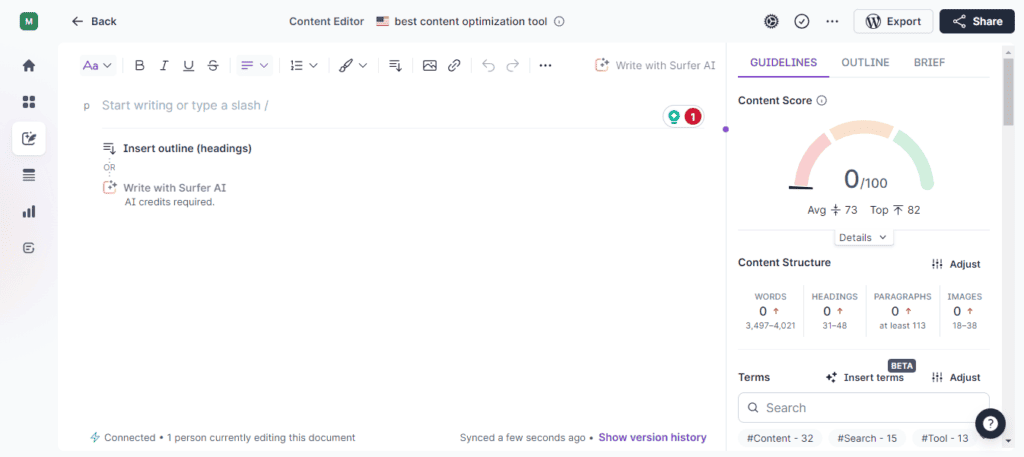
From the above screenshot, you can see that the Content Score is at zero. This is simply because I haven’t input any text into the editor for Surfer to analyze by comparing it against others on the same topic.
One thing about Surfer is that it has an Outline Builder that can help you create a nice brief before you begin writing.
In this next image, I’ve added a heading and a few intro paragraphs to see my Surfer SEO score:
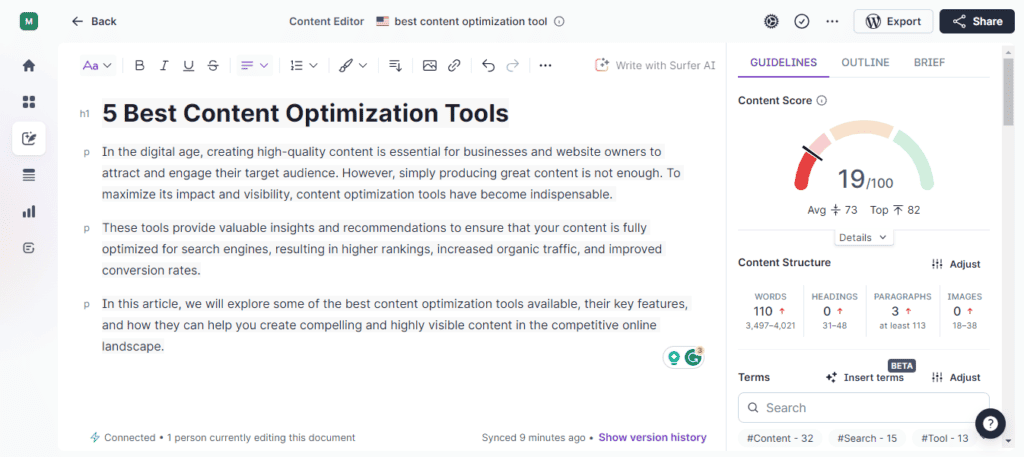
While the score has gone up, I still have lots of elements to add to the document to make it match some of the top results pages ranking for the keyword. According to Surfer, I’ll need to hit the following at the minimum to (have a chance to) rank well:
- 3,497 words
- 31 headings
- 113 paragraphs
- 18 images
And there’s more. Specific keywords (called semantic keywords) also have to appear in the content for it to rank. Surfer will show you these keywords and how many of them you need in your blog article.
Check the below example:
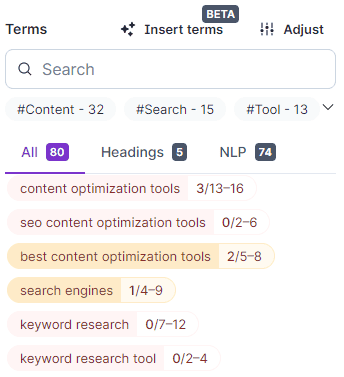
Surfer has something called Terms Assistant in the Content Editor that can automatically incorporate the listed semantic keywords into your content. You’ll need a minimum word count (50 percent of the required content length) for it to happen.
If you meet Surfer’s suggested content requirements, your score can move up to the 70s, 80s, and 90s, all of which are good. If I were you, I would try to hit the least number of text and images and add as many semantic keywords as possible to improve the score.
Semrush: Content Optimization
As mentioned earlier, Semsrush is a suite of tools. So, it also has a selection of content optimization tools: SEO Content Template and SEO Writing Assistant.
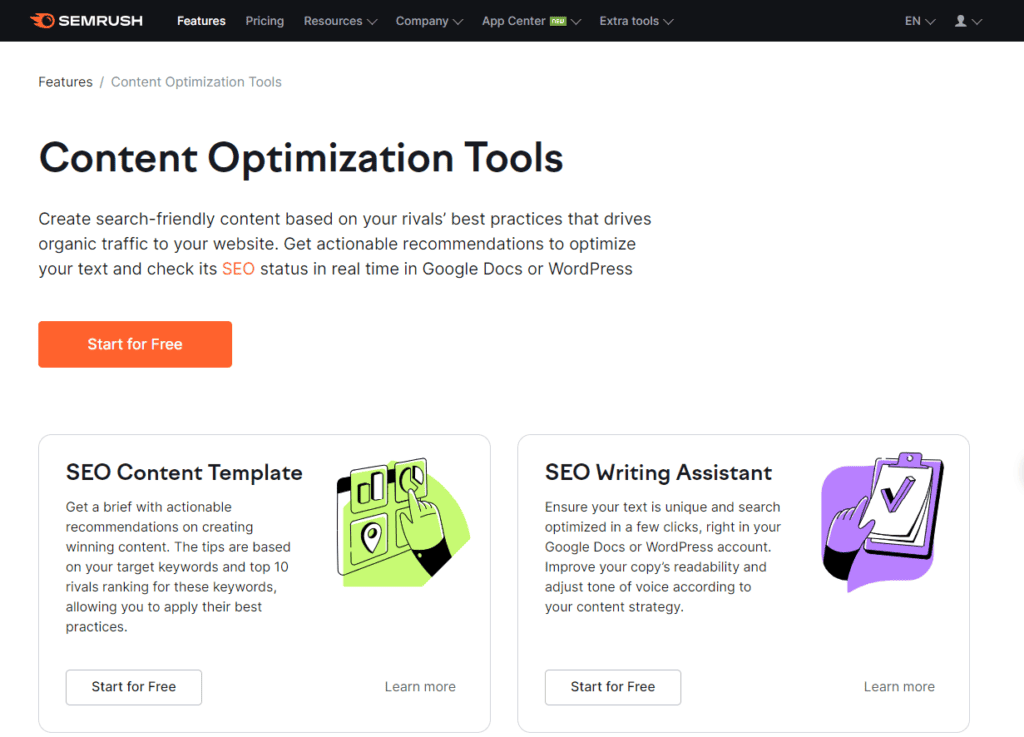
SEO Content Template
SEO Content Template is the tool for generating briefs. You simply enter a keyword and the tool creates an SEO-friendly outline.

You can also save the brief to use on Google Docs or if you would like to share it with others without giving them access to your account.
SEO Writing Assistant
This SEO writing tool is made for actually ensuring you create SEO-friendly articles. You just enter a keyword and SEO Writing Assistant will give you recommendations for content optimization as you write.

It’s available as an add-on for Google Docs, WordPress, and Microsoft Word to save time by giving you the data you need to create an optimized article without switching between different tools or browser tabs.
SEO Writing Assistant analyzes your content for readability, SEO, originality, and tone of voice. It also provides suggestions for improvement, as shown below:
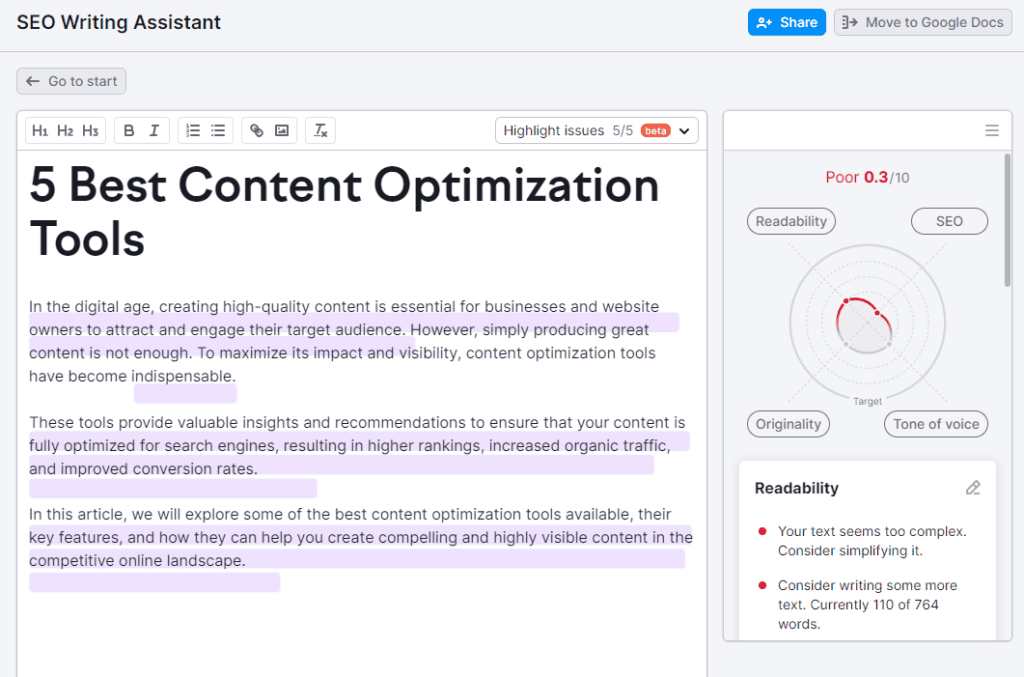
Verdict: Which Tool Is Better for Content Optimization?
Winner: Surfer SEO
There’s no doubt that Surfer SEO is what you need for your content optimization efforts. Semrush’s tools for this purpose are good but don’t match Surfer’s.
Surfer SEO: Competitor Analysis
With Surfer, you can also spy on your competitors’ rankings. This is possible with its SERP Analyzer tool.
We also begin by entering a keyword into this tool:

You’ll first see this graph showing word count against the position on SERPs.

Scrolling down, you’re able to see the top pages ranking for the keyword. You can input your own or any other URL for comparison.
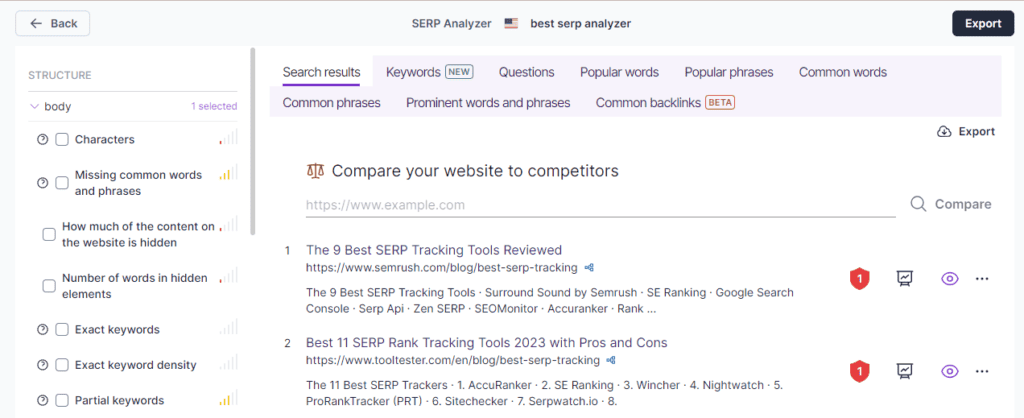
The tool will show you your Content Score and Domain Score.
Semrush: Competitor Analysis
Semrsush has several tools for analyzing your competitors. Besides their keywords and positions, you can find their backlinks too.
Keyword Gap
We’ve already seen an overview of this tool earlier in the article. Here is how it works.
What happens is that you simply enter your site and then a competitor’s site. Semrush will compare the two sites and identify keyword opportunities for you.
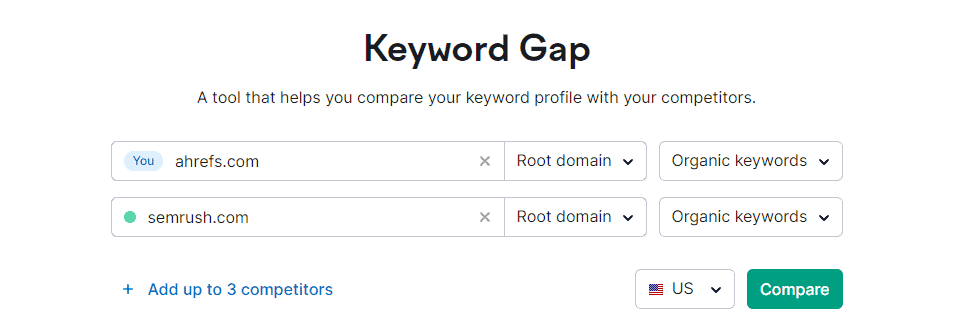
Check the Keyword Gap results as provided by Semrush:
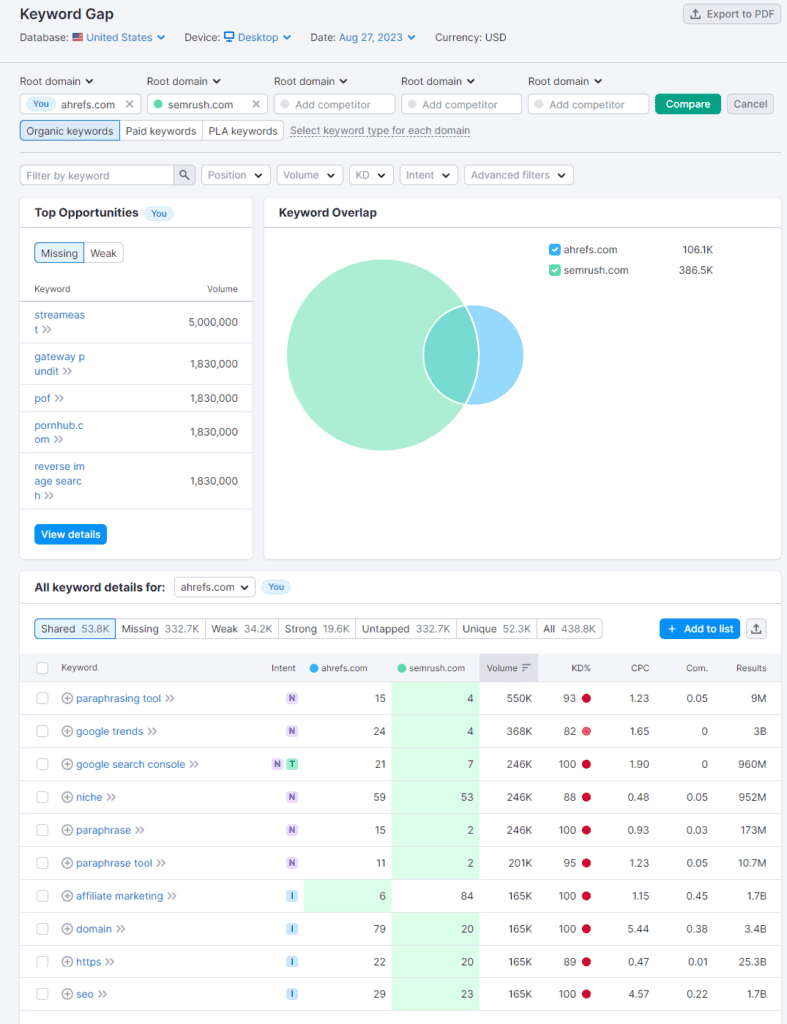
The result shows the keywords you and another website have in common, those that are missing, and more. You’ll be able to know what next to write about to get some of that traffic!
Organic Research
This tool can show a lot about your competitors. You simply enter the site URL, as shown below:

The result, which shows the site’s top keywords, position changes, pages, competitors, and more, is below:

In other words, the Organic Research Tool will give you everything you need to know about a competitor site. You can use the info to identify content opportunities and boost your organic traffic.
Backlink Gap
Next up is Backlink Gap, the tool for spying on competitors’ backlink profiles and finding opportunities for links to your site too.
You just need to enter the site address:
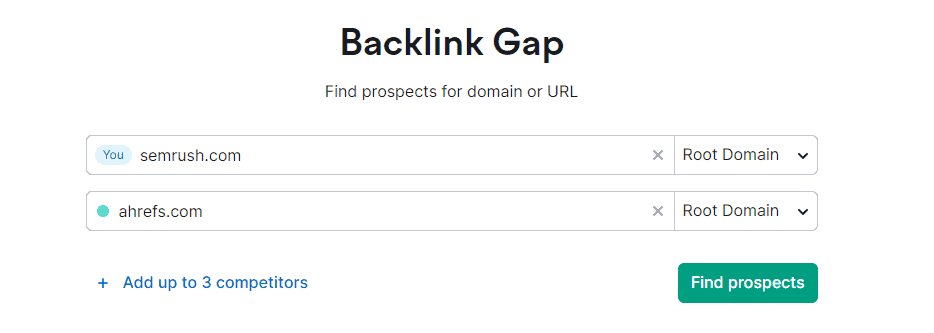
Semrush will identify prospects for you to generate new backlinks. It shows sites that have linked to your competitor but may have not linked to you.
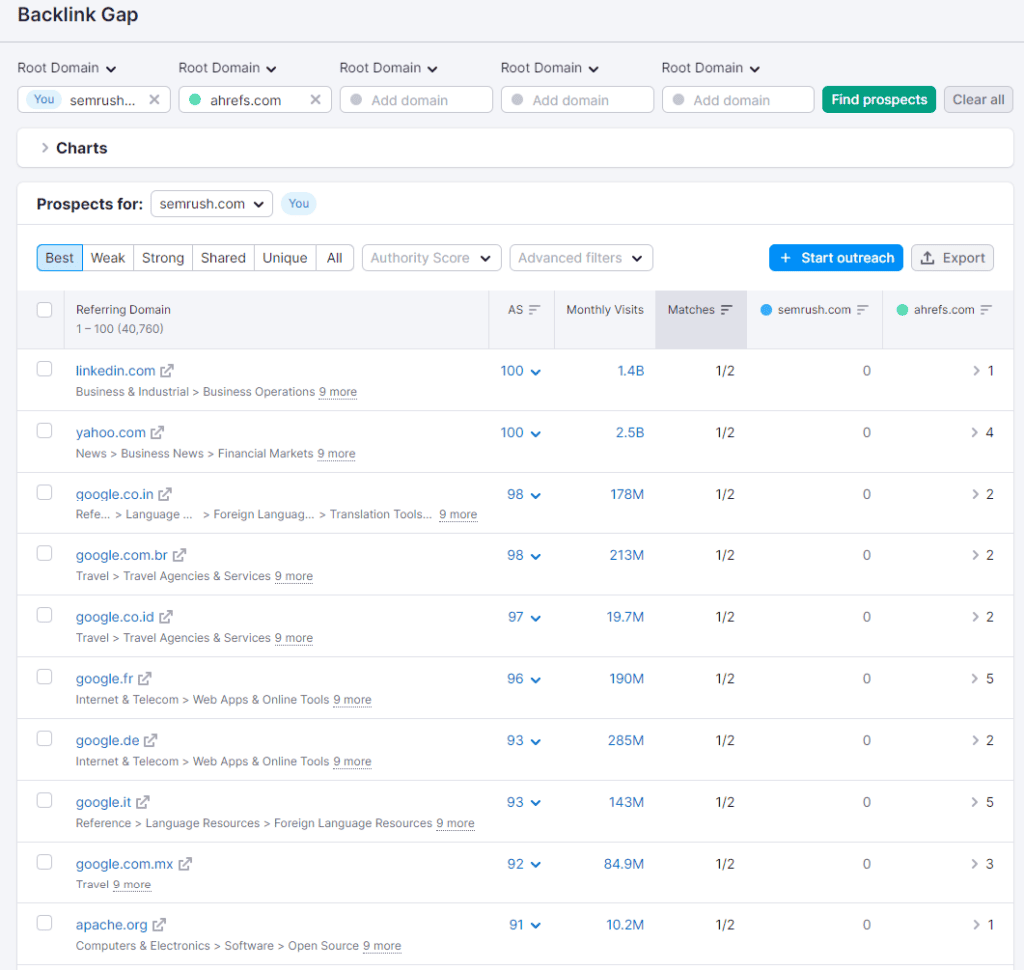
You can create better content and ask the prospects to link to you too. This is what’s called the skyscraper technique in SEO.
Verdict: Which Tool Is Better for Competitor Analysis?
Winner: Semrush
Clearly, Serush is your friend if what you need to do is spy on other sites in your niche. Surfer’s competitive research tools only show the top position for a specified keyword along with the positions.
Semrush, on the other hand, goes deep into comparing your site against others to show you keyword and backlink opportunities. You’ll need a tool like Semrush if you’re into link building.
Surfer SEO vs Semrush: Pricing
How much does each tool cost to use?
Is Surfer SEO Free?
No, Surfer SEO isn’t a free SEO tool. It also doesn’t have a free trial at the moment.
You’ll need to subscribe to one of its plans to be able to access its features.
How Much is Surfer SEO?
Surfer SEO’s plans are shown below:
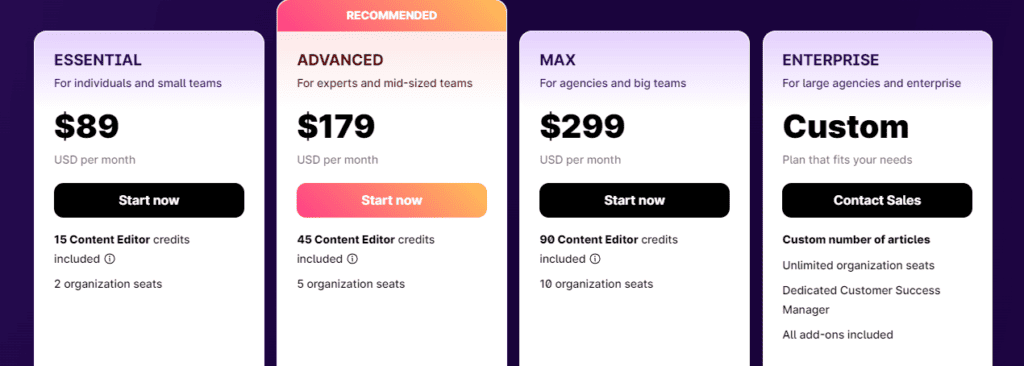
- Essential: $89/month
- Advanced: $179/month
- Max: $299/month
- Enterprise: Custom pricing
Is Semrush Free?
Semrush has a free version where you just need to sign up with your email. You’ll access some of the tools in its set, but you’re limited in how many requests you can send per day.
You’ll need an active subscription to access all features. The good this is that there’s a free Semrsuh trial for the Pro and Guru plans.
How Much is Semrush?
Semrush prices are as follows:
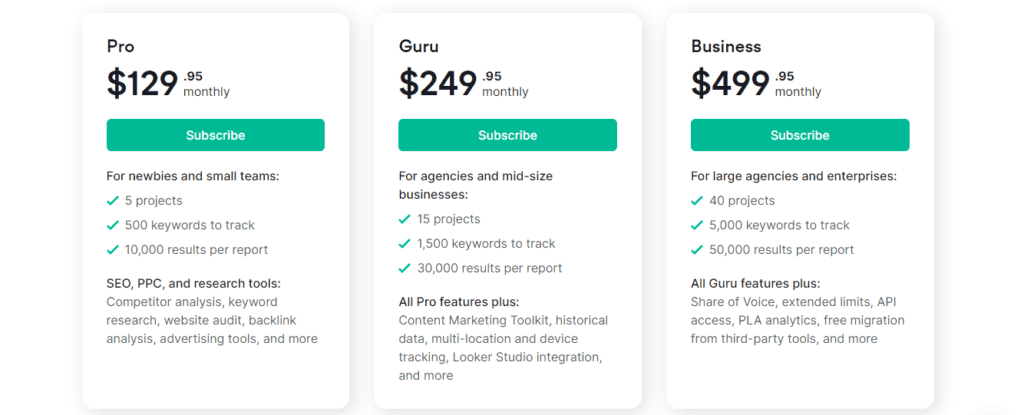
- Pro: $129.95/month
- Guru: $249.95/month
- Business: $499.95/month
Verdict: Which Tool Is Cheaper?
Winner: No winner
Yes, Surfer SEO is cheaper. But Semrush offers a free version and a trial period, something that Surfer lacks.
Still, comparing the prices of these two tools isn’t very beneficial since the tool you select is one that suits the SEO tasks you want to automate.
Surfer SEO vs Semrush: FAQs
Is Surfer SEO Better than Semrush?
Surfer SEO is better than Semrush when it comes to content optimization. Surfer’s content editor with comprehensive features is something that Semrush lacks.
However, the only reason for this is that Semrush focuses on other aspects of SEO and not content planning, writing, and optimization like Surfer.
What Are the Similarities between Surfer SEO and Semrush?
Surfer SEO and Semrush have a few similarities. The biggest similarity is that they’re both tools for SEO and can help you rank better.
Surfer and Semrush also both have keyword research tools, content optimization tools, and competitor analysis tools. However, each platform focuses on different areas of SEO and you’ll find that one is better at specific tasks compared to the other.
What Is the Difference between Surfer SEO and Semrush?
The difference between Surfer SEO and Semrush is that Surfer is a content optimizer while Semrush is a comprehensive SEO and marketing tool.
Surfer works well for optimizing your content’s keywords and adding various on-page elements to make it more SEO-friendly. If you want to do keyword research, analyze competitors, or find backlink opportunities, among other things, Semrush suits you.
Surfer SEO vs Semrush: Final Verdict
The conclusion is that while both SEO tools are great, they’re better suited for separate purposes. Surfer SEO is the better on-page SEO tool for content optimization to make your posts rank with your target keywords.
Semrush is the off-page SEO platform you’ll need to do in-depth keyword research and competitor analysis for keywords and backlinks. Semrush also functions as a technical SEO tool for identifying SEO issues on your site.
This means that you can even use both tools for your various SEO needs. So, feel free to check them out and sooner rather than later, your website will make good progress on search results!

